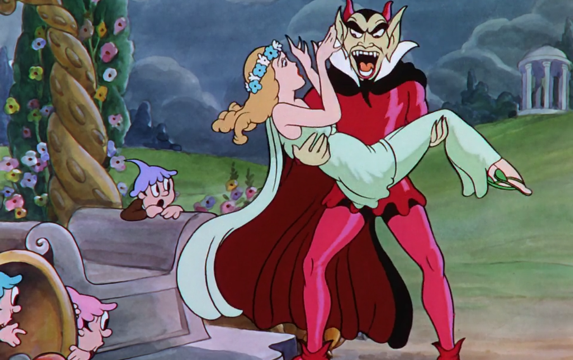In a way, it really doesn’t matter about the contents of this short. It was a test of concept. Arguably, what we have here is the first Disney Princess, the one who was testing realistic animation in preparation for Snow White who was to follow her. It seems clear to me that they learned things from her, too. Her appearance show definite similarity, but you can also see where the animators realized they’d have to change things from Funny Animal animation. And I wouldn’t be me if I didn’t suggest that she also contributed to Hercules and its utter failure to understand Greek mythology.
Persephone (Diana Gaylen) is wafting about in a wonderland of spring. (Speaking of roots, the dancing flowers would come back for Fantasia.) We definitely get the “all of nature loves her” thing that would become a staple for decades to come. Almost immediately, however, Hades (Tudor Williams, who was in both Citizen Kane and How Green Was My Valley) abducts her and takes her to Hell. He seats her on a jeweled throne and crowns her. Imps sing a jazz number, unlike the sweet and wholesome music on the surface. But there’s no joy on the surface; winter has come.
One of the things that has always bothered me about adaptations of Greek mythology is that they don’t understand it. I’ve never seen the Disney Hercules (you can only make me do it by paying me quite a lot on either Patreon or Ko-fi), in part because I’m the sort of person who, as a child, had Isaac Asimov’s Words From the Myths as a favourite book. How angry will that movie make me? I’ve been reading D’Aulaires’ Book of Greek Myths with my son. I can tell you about all sorts of variations of this myth, including the charming one I’ve seen where Demeter (not appearing in this short) is being overprotective and Persephone doesn’t need her and isn’t kidnapped.
But what’s universal in Greek variants, all of them, is that Hades isn’t a villain. Oh, abducting his niece is pretty terrible, but on the other hand, he’s the only one of his brothers who is faithful to his wife, so. And how many women did Zeus abduct throughout mythology? What we have here is not Hades but Mephistopheles. And since he and Persephone are the only two characters with any lines, it’s quite hard to understand why she keeps her promise to return. Why he thinks it’s something he deserves a promise on. Really, the whole ending is disjointed because it’s so in isolation from . . . mythology.
Did I write about this short because the cherry tree out my window is finally, weeks behind most of the rest of the ones in the area, finally breaking from bud to bloom? . . . Yes. Yes, I did. It’s lovely and I’m happy, and let’s go with an obscure Disney celebration of one of my two favourite seasons. But it’s also a bit of a Disney landmark; Hercules jokes aside, there is definitely this short in the DNA of both Snow White and Fantasia. Disney had a longstanding tradition of practicing on the shorts before launching into the movies—it’s one of the greatest losses of the shorts division, in my opinion—and it starts here.

